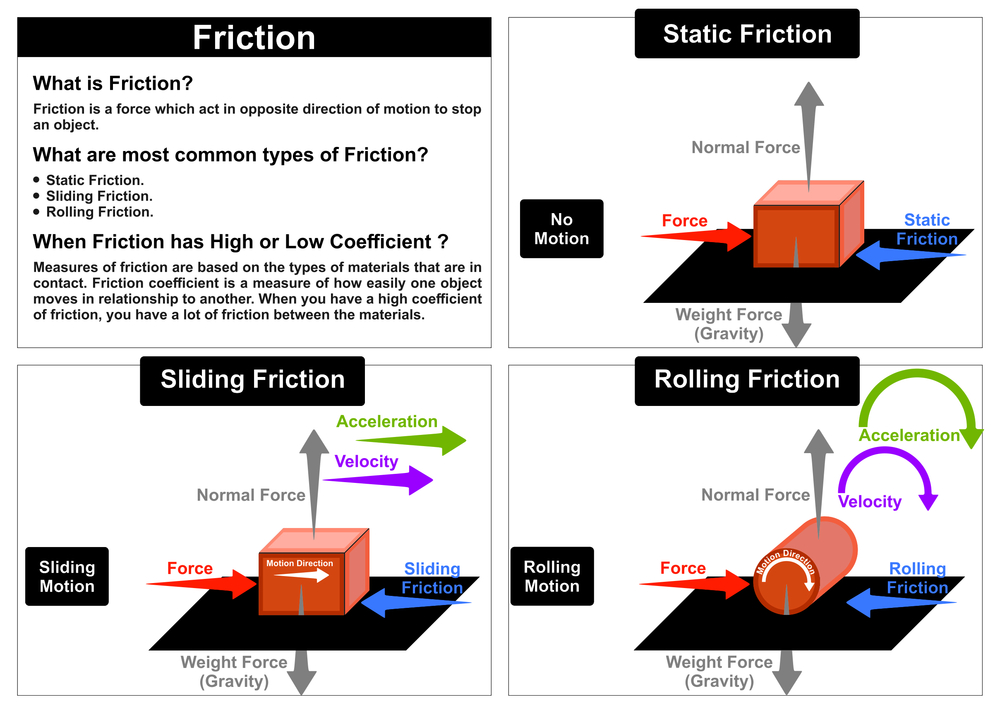Friction Class 8 Notes NCERT and MCQs
 23-08-2023
23-08-2023
 17:13 PM IST
17:13 PM IST
 Yadvendra Singh
Yadvendra Singh
The chapter discusses different concepts associated with friction such as static friction, sliding friction, rolling friction and fluid friction. It provides factors affecting friction and ways to increase and decrease friction. Why does a cycle slow down on applying brakes? Why does a ball on the ground stops after sometime? These all questions will be answered in here.
Friction
Friction opposes the relative motion between two surfaces in contact. It acts on both the surfaces. Friction is caused by the interlocking of irregularities in the two surfaces.
Factors affecting Friction
Friction is affected by following factors.
- Friction depends on the nature of surfaces in contact. For a given pair of surfaces friction depends upon the state of smoothness of those surfaces. Friction is greater if a rough surface is involved.
- Friction depends on how hard the two surfaces press together. Friction will increase if the two surfaces are pressed harder.
Types of Friction
Static friction: Static friction comes into play when we try to move an object at rest. Force required to overcome friction at the instant an object starts moving from rest is a measure of static friction.
Sliding friction: Sliding friction comes into play when an object is sliding over another. Sliding friction is smaller than static friction. The force required to keep the object moving with the same speed is a measure of sliding friction.
Rolling friction: When one body rolls over another body, rolling friction comes into play. Rolling reduces friction. Rolling friction is smaller than sliding friction. In many machines, sliding is replaced by rolling by the use of ball bearings and friction is reduced.
Fluid friction: The fluids (air, water and other liquids) exert frictional force on objects moving through them. This is called fluid friction. It is also called drag. It depends on speed of the object with respect to the fluid, shape of the object and the nature of the fluid. Fluid friction can be minimised by giving suitable shapes to bodies moving in fluids.

Fig.1: Types of Friction
Friction as a necessary evil
Friction is important for many of our activities. If there had been no friction, an object in the motion would have remained in motion. It would have been difficult to drive, to write, to construct a building, to fix a nail in wall, etc. However, it is an evil too. It wears out materials such as screws, ball bearings and soles of shoes. It can produce heat. Heat generated during operation of machine causes wastage of energy.
Ways to increase friction
Friction is desirable in some situations. It can be increased by making a surface rough. The sole of the shoes and the tyres of the vehicle are treaded to increase friction. It provides better grip with the ground. Friction is increased by using brake pads in the brake system of bicycles and automobiles. Gymnasts apply coarse substance on their hands to increase friction as it provides better grip to them. Similarly, kabaddi players rub soil on their hands for better grip of the opponent.
Ways to decrease friction
Friction is sometimes undesirable. Friction can never be entirely eliminated. It can be reduced by using lubricants such as oil and grease. Applying oil on the hinges of door reduces the friction and the door moves smoothly. The substances which reduce friction are called lubricants. The moving parts of a machine are greased to reduce friction and increase efficiency. In some machines, an air cushion between the moving parts is used to reduce friction.
MCQs based on NCERT Class 8 Science Chapter 12: Friction
1. Which of the following is the correct arrangement of static friction, sliding friction and rolling friction in their increasing order?
a. Rolling friction, sliding friction, static friction
b. Sliding friction, rolling friction, static friction
c. Static friction, sliding friction, rolling friction
d. Static friction, rolling friction, sliding friction
Ans. a
Explanation:
Sliding friction is smaller than static friction. Rolling friction is smaller than sliding friction. So, the correct arrangement of static friction, sliding friction and rolling friction in their increasing order is rolling friction, sliding friction, static friction.
2. Sliding friction is __________ the static friction.
a. More than
b. Less than
c. Equal to
d. Cannot be compared
Ans. b
Explanation:
Sliding friction is less than the static friction. In case of sliding friction, contact points on the surface of the object do not get enough time to lock into contact points on the sliding surface, so the force required to keep the object moving with the same speed is less than required to move the object in rest.
Frequently Asked Questions (FAQs) about Friction
What are the factors that affect friction?
Why sportsmen use shoes with spikes?
How can we reduce friction?
Share Blog
 Latest
Latest 
Comments